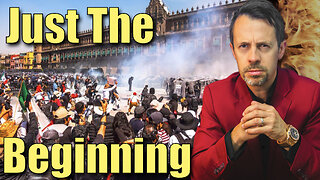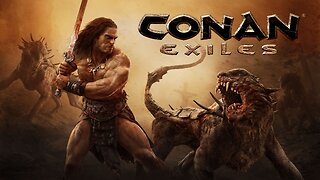Premium Only Content

Lost City of Atlantis ~ Full Documentary
Atlantis, a likely mythical island nation mentioned in Plato’s dialogues “Timaeus” and “Critias,” has been an object of fascination among western philosophers and historians for nearly 2,400 years. Plato (c.424–328 B.C.) describes it as a powerful and advanced kingdom that sank, in a night and a day, into the ocean around 9,600 B.C. The ancient Greeks were divided as to whether Plato’s story was to be taken as history or mere metaphor. Since the 19th century there has been renewed interest in linking Plato’s Atlantis to historical locations, most commonly the Greek island of Santorini, which was destroyed by a volcanic eruption around 1,600 B.C.
Plato’s Critias says he heard the story of Atlantis from his grandfather, who had heard it from the Athenian statesman Solon (300 years before Plato’s time), who had learned it from an Egyptian priest, who said it had happened 9,000 years before that. Whether or not Plato believed his own story, his intent in telling it seems to have been to boost his ideas of an ideal society, using stories of ancient victory and calamity to call to mind more recent events such as the Trojan War or Athens’ disastrous invasion of Sicily in 413 B.C. The historicity of Plato’s tale was controversial in ancient times—his follower Crantor is said to have believed it, while Strabo (writing a few centuries later) records Aristotle’s joke about Plato’s ability to conjure nations out of thin air and then destroy them.
Atlantis Reemerges
In the first centuries of the Christian era, Aristotle was taken at his word and Atlantis was little discussed. In 1627, the English philosopher and scientist Francis Bacon published a utopian novel titled “The New Atlantis,” depicting, like Plato before him, a politically and scientifically advanced society on a previously unknown oceanic island. In 1882, former U.S. Congressman Ignatious L. Donnelly published “Atlantis: The Antediluvian World,” which touched off a frenzy of works attempting to locate and learn from a historical Atlantis. Donnelly hypothesized an advanced civilization whose immigrants had populated much of ancient Europe, Africa and the Americas, and whose heroes had inspired Greek, Hindu and Scandinavian mythology. Donnelley’s theories were popularized and elaborated by turn-of-the-20th-century theosophists and are often incorporated into contemporary New Age beliefs.
From time to time, archaeologists and historians locate evidence—a swampy, prehistoric city in coastal Spain; a suspicious undersea rock formation in the Bahamas—that might be a source of the Atlantis story. Of these, the site with the widest acceptance is the Greek island of Santorini (ancient Thera), a half-submerged caldera created by the massive second-millennium-B.C. volcanic eruption whose tsunami may have hastened the collapse of the Minoan civilization on Crete.
-
 5:15
5:15
Seeker Land
23 days agoWorld's Safest Motorcycle - Powerful EV - Fully Enclosed for Long Distance Travel - The Monoracer
32 -
 LIVE
LIVE
Wendy Bell Radio
5 hours agoThis Is Why I Voted For Donald Trump
7,478 watching -
 LIVE
LIVE
Major League Fishing
4 days agoLIVE! - Fishing Clash Team Series: Summit Cup - Day 2
84 watching -
 LIVE
LIVE
Badlands Media
6 hours agoBadlands Daily: November 17, 2025
1,803 watching -
 19:55
19:55
Neil McCoy-Ward
2 hours ago🔥 It’s Not Just One Country Anymore (It’s Growing)
1984 -
 1:12:53
1:12:53
MTNTOUGH Podcast w/ Dustin Diefenderfer
8 hours agoNate Boyer: Green Beret to NFL at 34 | MTNPOD #142
67 -
 1:10:22
1:10:22
Chad Prather
14 hours agoBorn in the Fire: Spirit Filled Truth, Repentance, and Revival
78K49 -
 LIVE
LIVE
LFA TV
16 hours agoLIVE & BREAKING NEWS! | MONDAY 11/17/25
2,615 watching -
 LIVE
LIVE
MissMom
1 hour agoHi Everyone! | My First Stream
143 watching -
 1:31:40
1:31:40
Game On!
16 hours ago $7.52 earnedNFL Week 11 RECAP And MNF Best Bets!
18.7K2